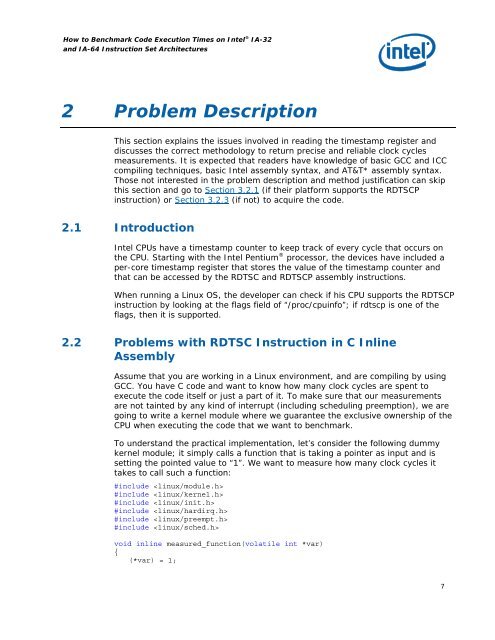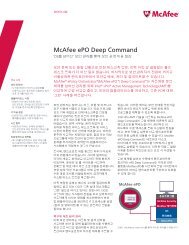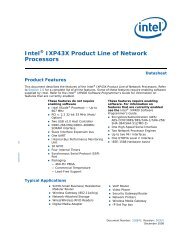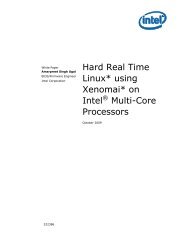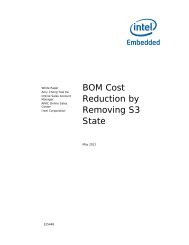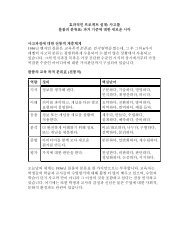How to Benchmark Code Execution Times on Intel IA-32 and IA-64 ...
How to Benchmark Code Execution Times on Intel IA-32 and IA-64 ...
How to Benchmark Code Execution Times on Intel IA-32 and IA-64 ...
You also want an ePaper? Increase the reach of your titles
YUMPU automatically turns print PDFs into web optimized ePapers that Google loves.
<str<strong>on</strong>g>How</str<strong>on</strong>g> <str<strong>on</strong>g>to</str<strong>on</strong>g> <str<strong>on</strong>g>Benchmark</str<strong>on</strong>g> <str<strong>on</strong>g>Code</str<strong>on</strong>g> <str<strong>on</strong>g>Executi<strong>on</strong></str<strong>on</strong>g> <str<strong>on</strong>g>Times</str<strong>on</strong>g> <strong>on</strong> <strong>Intel</strong> ® <strong>IA</strong>-<strong>32</strong><br />
<strong>and</strong> <strong>IA</strong>-<strong>64</strong> Instructi<strong>on</strong> Set Architectures<br />
2 Problem Descripti<strong>on</strong><br />
This secti<strong>on</strong> explains the issues involved in reading the timestamp register <strong>and</strong><br />
discusses the correct methodology <str<strong>on</strong>g>to</str<strong>on</strong>g> return precise <strong>and</strong> reliable clock cycles<br />
measurements. It is expected that readers have knowledge of basic GCC <strong>and</strong> ICC<br />
compiling techniques, basic <strong>Intel</strong> assembly syntax, <strong>and</strong> AT&T* assembly syntax.<br />
Those not interested in the problem descripti<strong>on</strong> <strong>and</strong> method justificati<strong>on</strong> can skip<br />
this secti<strong>on</strong> <strong>and</strong> go <str<strong>on</strong>g>to</str<strong>on</strong>g> Secti<strong>on</strong> 3.2.1 (if their platform supports the RDTSCP<br />
instructi<strong>on</strong>) or Secti<strong>on</strong> 3.2.3 (if not) <str<strong>on</strong>g>to</str<strong>on</strong>g> acquire the code.<br />
2.1 Introducti<strong>on</strong><br />
<strong>Intel</strong> CPUs have a timestamp counter <str<strong>on</strong>g>to</str<strong>on</strong>g> keep track of every cycle that occurs <strong>on</strong><br />
the CPU. Starting with the <strong>Intel</strong> Pentium ® processor, the devices have included a<br />
per-core timestamp register that s<str<strong>on</strong>g>to</str<strong>on</strong>g>res the value of the timestamp counter <strong>and</strong><br />
that can be accessed by the RDTSC <strong>and</strong> RDTSCP assembly instructi<strong>on</strong>s.<br />
When running a Linux OS, the developer can check if his CPU supports the RDTSCP<br />
instructi<strong>on</strong> by looking at the flags field of “/proc/cpuinfo”; if rdtscp is <strong>on</strong>e of the<br />
flags, then it is supported.<br />
2.2 Problems with RDTSC Instructi<strong>on</strong> in C Inline<br />
Assembly<br />
Assume that you are working in a Linux envir<strong>on</strong>ment, <strong>and</strong> are compiling by using<br />
GCC. You have C code <strong>and</strong> want <str<strong>on</strong>g>to</str<strong>on</strong>g> know how many clock cycles are spent <str<strong>on</strong>g>to</str<strong>on</strong>g><br />
execute the code itself or just a part of it. To make sure that our measurements<br />
are not tainted by any kind of interrupt (including scheduling preempti<strong>on</strong>), we are<br />
going <str<strong>on</strong>g>to</str<strong>on</strong>g> write a kernel module where we guarantee the exclusive ownership of the<br />
CPU when executing the code that we want <str<strong>on</strong>g>to</str<strong>on</strong>g> benchmark.<br />
To underst<strong>and</strong> the practical implementati<strong>on</strong>, let’s c<strong>on</strong>sider the following dummy<br />
kernel module; it simply calls a functi<strong>on</strong> that is taking a pointer as input <strong>and</strong> is<br />
setting the pointed value <str<strong>on</strong>g>to</str<strong>on</strong>g> “1”. We want <str<strong>on</strong>g>to</str<strong>on</strong>g> measure how many clock cycles it<br />
takes <str<strong>on</strong>g>to</str<strong>on</strong>g> call such a functi<strong>on</strong>:<br />
#include <br />
#include <br />
#include <br />
#include <br />
#include <br />
#include <br />
void inline measured_functi<strong>on</strong>(volatile int *var)<br />
{<br />
(*var) = 1;<br />
7


